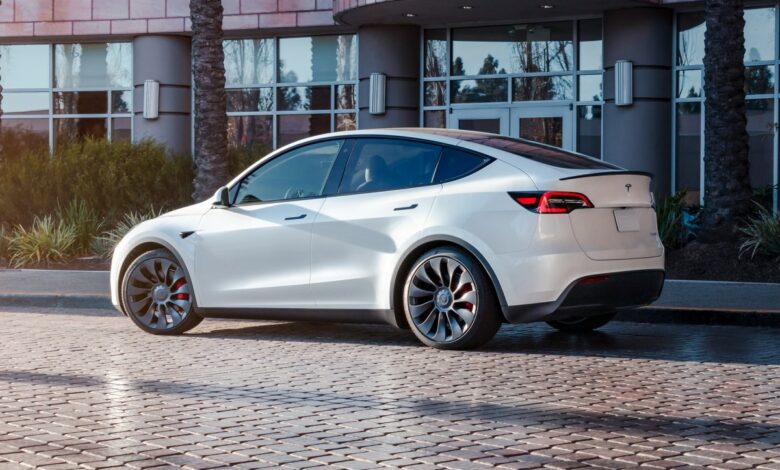TechCrunch Mobility: Apple layoffs, an EV price reckoning and another Tesla robotaxi promise

Welcome back to TechCrunch Mobility — your central hub for news and insights on the future of transportation. Sign up here — just click TechCrunch Mobility — to receive the newsletter every weekend in your inbox. Subscribe for free.
Automakers reported auto sales for Q1 and, welp, turns out that pricing sure does matter if you want to sell EVs. Who would have thought? A recent survey by Edmunds comes to a similar conclusion (at least for American buyers), finding a big gap between what consumers want and what is actually available on the market.
Here’s the crux. According to the Edmunds survey, 47% say they are seeking an EV purchase below $40,000, and 22% are interested in EVs priced below the $30,000 threshold. Today, there are no new EVs priced below $30,000 and only four below the $40,000 mark. The average price of an EV in 2023 was $61,702, while all other vehicles stood at $47,450.
This mismatch of realities is squeezing automakers as they try to move inventory by slashing prices. This downward pressure has forced automakers like Ford to delay future EV launches and put more resources toward hybrids. Even Tesla, a bellwether in the EV world, fell well below analysts’ expectations with deliveries down 20% from Q4 2023. Meanwhile, EV upstart Rivian posted tepid results.
What’s the answer? Well, over at Tesla, it seems the solution is twofold: slash prices again and try to capture revenue through sales of its Full Self-Driving software that costs $12,000 and is currently being offered in a free one-month trial to all customers.
OK, folks, let’s jump into the rest of the news!
A little bird
Founders, investors, engineers, policy wonks and others tell us things. And we’re here to pass along the verifiable information that those little birds have shared with us.
This week, a little bird tipped us on the closure of Ghost Autonomy, which had raised upward of $220 million and recently partnered with OpenAI. A couple of calls, emails and a fresh posting on the company’s website confirmed the tip. About 100 people were affected.
As I noted in my article, Ghost has pivoted a few times since it was founded in 2017. When I asked founder and CEO John Hayes what happened, he said the company had completed a highway driving product and was moving in urban environments through what he described as “last-mile delivery.”
“Ultimately, the years required to bring the product to market could not be financed,” he wrote to me in an email.
Got a tip for us? Email Kirsten Korosec at kirsten.korosec@techcrunch.com or Sean O’Kane sean.okane@techcrunch.com. If you prefer to remain anonymous, click here to contact us, which includes SecureDrop (instructions here) and various encrypted messaging apps.
Deal of the week
Startup founders, listen up — a new fund just closed. Get your slide decks ready.
Maniv, the Israel and now NYC-based VC firm, raised a $140 million fund with plans to stick to its early-stage investment strategy of backing startups at the intersection between mobility, transportation and energy.
As I noted in my longer feature, the firm’s approach has evolved a bit by expanding geographically and diversifying its investor base. The firm has also largely stopped using the once trendy umbrella term “mobility” (often leaving it out of its original name Maniv Mobility) and has opted instead to talk about deep tech, decarbonization and digitization of the transportation sector.
Investors in the fund are no longer dominated by automakers and Tier 1 suppliers. Instead, Maniv has opened up to a broader swath of strategic and institutional financial investors, including BNP Paribas Personal Finance and the venture arms of Shell and Enterprise Mobility.
The Maniv III fund also includes return investors Valeo and Jaguar Land Rover venture arm InMotion Ventures. Toyota Motor Corp.’s Woven Capital, vehicle leasing company Arval, transportation infrastructure giant Ferrovial, the industrial manufacturing firm ITT Inc., fleet payments business WEX and an unnamed European insurance company also participated in the fund.
Other deals that got my attention …
Alsym Energy, a Massachusetts-based startup developing nonflammable battery chemistry, raised $78 million in a Series C round led by General Catalyst and Tata, the Indian conglomerate, with participation from Drads Capital, Thomvest and Thrive Capital.
BlaBlaCar, the French carpooling and bus ticketing company, secured a €100 million revolving credit facility ($108 million at today’s exchange rate).
Notable reads and other tidbits
Autonomous vehicles
Waymo and Uber expanded on an ongoing partnership that will affect Uber Eats’ customers in the metro Phoenix area. Now when folks order a burrito or a pizza or some other treat through Uber Eats, they may have their meals delivered by a Waymo vehicle. The tie-up will begin with select merchants in Chandler, Tempe and Mesa, including restaurants like Princess Pita, Filiberto’s and BoSa Donuts.
Electric vehicles, charging & batteries
Apple is laying off 614 employees in California after abandoning its electric car project. According to the WARN notice posted by the California EDD, most of the affected employees were working at buildings related to its canceled car project, while others were working at a facility for its next-generation screen development, Bloomberg reported.
Canoo finally reported its Q4 and full-year earnings. Tucked inside the regulatory filing is a nugget regarding the use of CEO Tony Aquila’s private jet — just one of many expenses that illustrates the gap between spending and revenue at the EV startup. Tl;dr: Canoo spent double its annual revenue on the CEO’s private jet in 2023.
Faraday Future narrowly avoided an eviction from its Los Angeles headquarters. The company reached an agreement with the owner of the building, Rexford Industrial, to stay at the facility as long as it meets a few conditions. If Faraday violates any of the terms, Rexford has the right to trigger a 48-hour demand for payment and can boot the startup if it doesn’t pay up. If Faraday Future makes its payments, it can stay in the building until September 2025 when the lease expires.
The National Highway Traffic Safety Administration opened a third investigation into Fisker’s Ocean SUV, this time centered on problems getting the doors to open.
Tesla is reportedly abandoning its plan to build a lower-cost EV thought to cost around $25,000, according to Reuters, despite that vehicle’s status as a pivotal product for the company’s overall growth. Apparently, Tesla will instead focus on a planned robotaxi that is being built on the same small EV platform that was also supposed to power the lower-cost vehicle. This is where it gets a bit silly. Just hours after Tesla CEO Elon Musk said Reuters was lying, he posted on X that the Tesla robotaxi would be revealed August 8. Go figure.
This week’s wheels
This week’s wheels is taking a one-week hiatus while I enjoy a bit of vacation time. But don’t worry, it’s back next week and I have a few vehicles lined up, including the Mercedes-Benz EQE 350 4Matic sedan, a Lexus LC500 hybrid and a Mercedes eSprinter. Plus, some e-bikes will soon be in the mix.
What vehicles — including the two-wheeled variety — are you interested in reading about? I’ll put them on my list.
Source link







